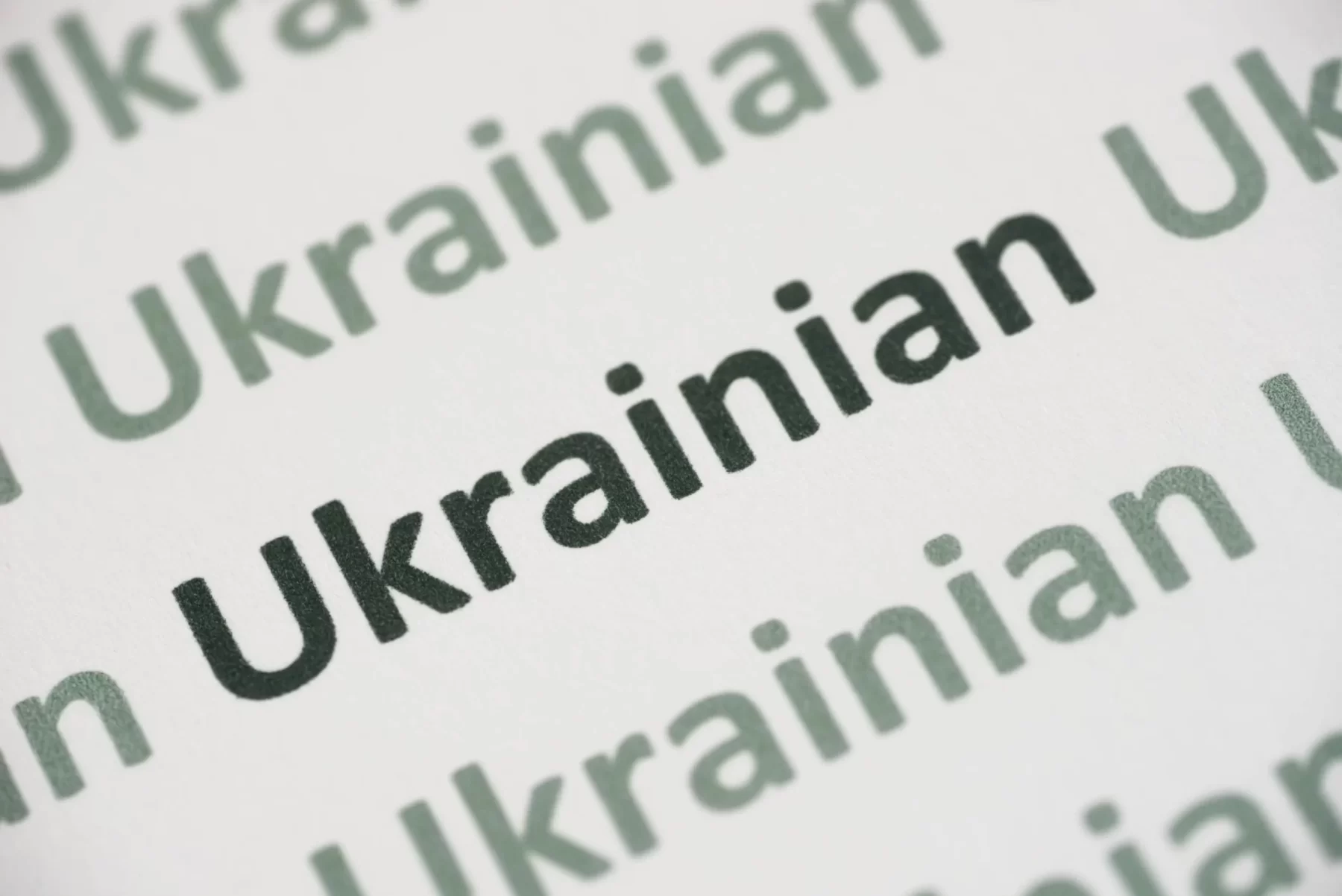The Growing Need for Ukrainian Translation

With the arrival of millions of Ukrainian refugees across Europe, organizations need to consider the Ukrainian translation of their texts. It is also worth including Russian translation, as this is often a first language for many Ukrainians and a second language for most. Communication becomes critical at a time when political and cultural tension is high. It is then crucial to avoid any language barriers.
According to the UN, 6.3 million people fled Ukraine at the time of writing, and many sought refuge in neighboring countries. Poland has received the most significant number of refugees, reported as 3,396,792, followed by Romania, with 930,341 people. Ukrainians travel across Eastern Europe to countries such as Germany and the UK.
Although Ukraine is not part of the European Union (EU), Ukrainians have been granted the right to stay for three years by the EU within its 27 member states. Refugees will have access to medical treatment, social welfare, housing, and schools. As a result, several public organizations and private businesses will need a Ukrainian translator to communicate effectively with Ukrainian people, especially those who need urgent help and humanitarian assistance.
English to Ukrainian Translation for Health Workers and Hospitals
Where refugees are victims of violence, injured due to bombing raids, or pregnant, extra care must be taken to ensure those affected are helped promptly. Communication in Ukrainian is essential to ensure people can be treated effectively and quickly. Consider translating patient information and medicine labels into Ukrainian or Russian if you work for a health organization.
In Moldova, for example, the United Nations High Commissioner for Refugees has estimated that 36% of refugees are children, around half are girls, and half are boys. They also estimate that 80% are women. In any country, the ability to provide important information in Ukrainian or Russian will be the difference between a successful or failed settlement of the refugees.
Although the influx of Ukrainian refugees is not as large as it was two years ago, their needs are still growing and changing. Right now, the ability of Ukrainians to make decisions about their future is limited. It cannot be ruled out that many of them will remain in other European countries for an extended period of time. In addition to the emergency assistance provided by host countries in the immediate aftermath of the war, more and more people require long-term medical and psychological help, treatment for chronic diseases, as well as effective preventive health care.
Benefits of Health Resources and Documents in Ukrainian
When it comes to Ukrainian and other old east Slavic languages, machine translation is still very poor. It doesn't translate the proper vocabulary, nuances, and makes severe mistakes in grammar when translating Cyrillic languages. At the same time, the ability to understand one another fully is the most basic requirement for effective treatment. This is why health workers and hospitals should invest in quality translation:
- Access to information - by translating medical documents, instructions, and resources into Ukrainian, healthcare providers can ensure that refugees understand their rights, available services, and how to access medical care.
- Informed consent -ensuring that patients understand the risks and benefits of medical procedures or treatments before agreeing to them is a fundamental principle in healthcare. Providing consent forms and medical information in Ukrainian allows Ukrainian-speaking refugees to make informed decisions when needed.
- Legal compliance - providing resources in Ukrainian helps professionals comply with specific requirements and meet their legal obligations to guarantee equal access to healthcare services, as well as culturally and linguistically appropriate care.
- Effective communication - precise translation of medical histories, symptoms, and treatment plans is essential for accurate diagnosis and treatment. It means health professionals can communicate more effectively with Ukrainian patients, reducing the risk of misunderstandings or errors.
- Preventive care - providing resources in Ukrainian on topics such as nutrition, hygiene, and disease prevention can empower refugees to take proactive steps to maintain their health and prevent illness.
- Mental health support - apart from the trauma of flight itself, many refugees struggle with grief and fear for their loved ones and their future. Settling into unfamiliar societies and coping with a new daily life also has significant psychological consequences. This is particularly relevant at a time when public opinion towards Ukrainians in many countries may be changing. Translating mental health resources, counseling services, and crisis intervention information into Ukrainian ensures that refugees can access the help they need in their own language, facilitating better mental health outcomes.
- Cultural sensitivity - healthcare practices and beliefs can vary widely between cultures. Using the Ukrainian language in healthcare materials demonstrates cultural sensitivity and respect for the linguistic and cultural backgrounds of refugees. It helps to build trust between medical professionals and patients.
Ukrainian Translation for Business and Hospitality Use
Along with hospitals, healthcare providers and organizations providing humanitarian assistance, several sectors should consider quality Ukrainian translation services. Below are a few examples:
- Banks – although many refugees fled with little money, they will need to open bank accounts in their current country over time. There have been calls on EU banks to make this process easier; for example, lighter anti-money laundering checks and effective Ukrainian translations of banking documents will be essential.
- Offices – many Ukrainians are seeking employment in their new country. Employers should ensure that employment contracts and handbooks have been translated clearly.
- Food companies – consider translating labels for food products aimed at Ukrainians to explain contraindications for ingredients that could cause allergies.
- Hotels and restaurants – this might include translating information for emergency provisions. But there will come a time when Ukrainians can enjoy hospitality; therefore, improving customer service with high-quality translation for hotels and restaurants will benefit all parties.
- E-commerce platforms – Ukrainians need goods just like everyone else. Translating your website or online store will make you accessible to Ukrainian customers.
Ukrainian Translators Can Significantly Help Your Business
In December 2023, the European Council decided to open accession negotiations with Ukraine. As the experts from the think tank Bruegel say in their latest report, the war obviously complicates the process, but Ukrainians can work progressively towards meeting the accession conditions. And even before that happens, international business cooperation will be essential in rebuilding the country. Without a clear prediction of when it will be possible to return home, many Ukrainians may decide to stay where they are, becoming a new large target group to be considered.
The main advantages of investing in translation are:
- Market expansion - with a population of over 40 million, Ukrainians represent a significant market for businesses to tap into. Translating marketing materials, product information, and websites into Ukrainian can help businesses reach and engage with Ukrainian-speaking consumers more effectively.
- Competitive advantage - offering products or services in the Ukrainian language can give your company a competitive edge. It demonstrates a commitment to serving Ukrainian clients, potentially drawing them away from competitors not offering localized content.
- Improved communication - translating internal documents, emails, contracts, safety rules, and other communications into Ukrainian can facilitate better collaboration with Ukrainian employees, partners, and stakeholders.
- SEO benefits - online content in Ukrainian can also improve search engine visibility. By including relevant keywords in Ukrainian, businesses can attract more organic traffic from users searching in the Ukrainian language globally.
- Legal compliance - as far away as it may seem at the moment due to the geopolitical situation, a time will come when international commercial cooperation will find a new ground in Kyiv. Businesses may be required to provide information or documentation in Ukrainian to comply with local regulations or legal requirements. Ensuring that all necessary materials are accurately translated can help companies avoid potential legal issues or fines.
- Customer satisfaction - providing information in the customer's native language improves their overall experience with the brand. Native Ukrainian clients are more likely to feel valued and understood when they can access product descriptions, customer support, and other resources in their preferred language.
- Cultural relevance - language is closely linked to culture, and by translating content into Ukrainian, companies show respect for Ukrainian culture and customs, especially now. This cultural relevance can foster stronger connections with Ukrainian consumers, leading to increased trust and brand loyalty.
Ukrainian Translation Services with Localization
Localization is an integral part of any accurate translation service. Whether you are an organization producing public information or a business creating marketing, localizing your text for native Ukrainian speakers will ensure relevance. Localization provides a proper cultural context and helps to deliver translation tailored to your target audience.
We started providing Ukrainian translation services (involving such language pairs as Polish to Ukrainian / Russian, Ukrainian / Russian to Polish, and English to Ukrainian / Russian, Russian / Ukrainian to English) when a skilled Ukrainian translator, fluent in Polish and English, joined our team 2 years ago. By embracing these languages, your organization can effectively support displaced Ukrainian people. You will also be seen as inclusive and forward-thinking, ready to respond to the increasing need for more precise Ukrainian and Russian communication. At Langbay, we value responsibility and confidentiality, which means you can trust us with sensitive content, such as medical documentation, handbooks with safety regulations for your industry, and commercial contracts.
To help your business, we specialize in translating marketing materials and SEO-optimizing your content. Our services include localisation, transcreation, transcription, and subtitling. Our exceptional team of translators can also help you with advertisements and copywriting. Linguists at Langbay with relevant experience can perfectly combine accuracy and creativity in their translation process, giving your message greater impact and emotion than any automated translation could ever achieve. All our projects are carried out by specialists and proofread by native speakers. We never miss deadlines.
If you are looking for an English-Polish-Ukrainian-Russian translator to help you convey important information and messages, get in touch today and get a free quote. We are a distinguished boutique translation agency that cares about your language needs and goals.
Sources:
summary
We started providing Ukrainian translation services (involving such language pairs as Polish to Ukrainian / Russian, Ukrainian / Russian to Polish, and English to Ukrainian / Russian, Russian / Ukrainian to English) when a skilled Ukrainian translator, fluent in Polish and English, joined our team 2 years ago. By embracing these languages, your organization can effectively support displaced Ukrainian people. You will also be seen as inclusive and forward-thinking, ready to respond to the increasing need for more precise Ukrainian and Russian communication.
Do You Want to Reach Ukrainian Customers?
Don’t miss out on our expert translation and localization services tailored just for you. Fill out the form to get your free translation sample and take the first step toward your expansion to a new market.

Blog
Knowledge Base
Exclusive Bonus Just for You
Get Your Free eBook







